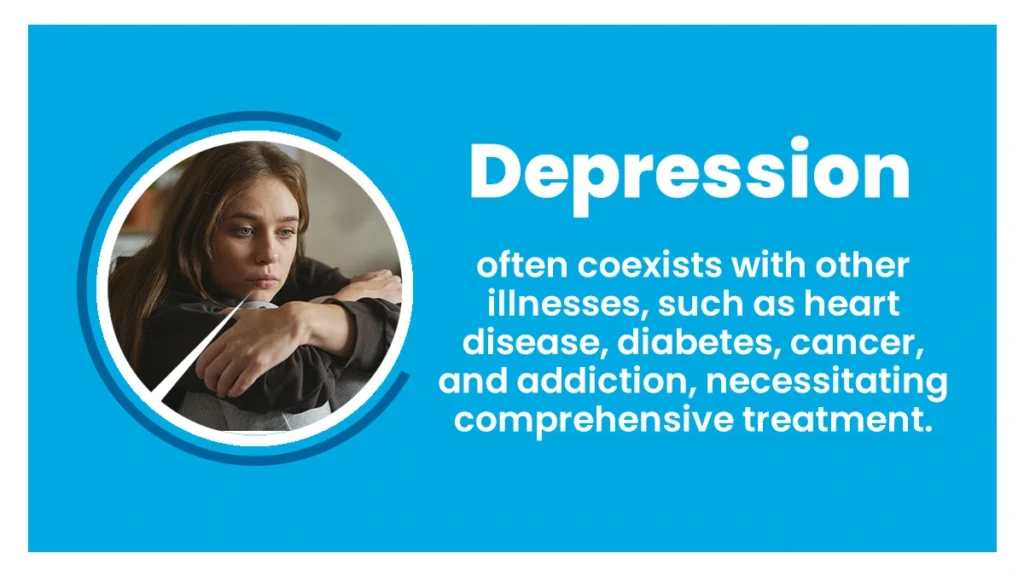Depression is a serious mental health condition that influences numerous people worldwide, causing emotional distress and impacting daily life. Yet, its reach extends beyond just the mind, as it can significantly affect the body too.
By uncovering the physical toll of depression, we hope to increase awareness and empathy toward those facing this challenge. Understanding these effects is crucial for offering support and seeking appropriate treatment.

So, let’s delve into the physical side effects of depression and shed light on how this mental health issue can manifest in tangible ways.
Key Takeaways
Depression’s mind-body connection leads to physical manifestations, including increased stress hormones, weakened immune systems, and sleep disturbances. This article will tell you:
- Major painful physical symptoms of depression include unexplained aches, fatigue, appetite changes, sleep issues, and digestive problems.
- Depression often coexists with other illnesses, such as heart disease, diabetes, cancer, and addiction, necessitating comprehensive treatment.
- Therapy, medication, or a combination can help individuals overcome depression and improve their emotional well-being.
- Early diagnosis, treatment, support from mental health professionals, and self-care strategies are crucial for managing depression and promoting overall well-being.
Ready to reclaim your life and boost your mental health? Contact The Haven Detox-Little Rock today at (501) 271-3342, and let’s embark on this transformative journey together toward healing and lasting recovery.
Depression: An Overview
Depression is a common mental health condition characterized by continuous sadness, loss of interest, and a lack of energy. It can vary in severity and duration, with some experiencing a major depressive episode.
There are different types of depression, and it can develop due to various factors, including genetic predisposition, life events, or chronic conditions. Understanding depression and its potential causes is crucial for providing appropriate support and seeking effective treatment options to improve overall well-being.
Understanding the Mind-Body Connection
The mind and body are intimately connected, and when it comes to depression, this link becomes even more apparent. Our thoughts and emotions can instantly affect our physical well-being, creating a two-way street of impact.
During depression, the brain’s chemistry changes how our body functions. Stress hormones, like cortisol, increase, leading to feelings of exhaustion and body pain. Consequently, our immune system weakens, making us more susceptible to infections.
Moreover, lacking motivation and interest in activities may result in a sedentary lifestyle, contributing to weight gain and muscle weakness. Sleep disturbances, common in depression, can further exacerbate physical issues.
Recognizing the mind-body connection is crucial for a comprehensive approach to managing depression. Integrating therapy, medication, and lifestyle changes can help alleviate this condition’s mental and physical symptoms.
Major Physical Symptoms of Depression
Depression can impact our bodies in various ways, leading to major physical symptoms that should not be ignored. Understanding these signs can help us seek the right support and treatment. Let’s delve into the most common symptoms of depression:
Unexplained Aches and Pains
Many individuals with major depression experience unexplained aches and pains throughout their bodies. This chronic pain may not have an apparent medical cause, but it can significantly affect physical health and quality of life. Consulting healthcare providers is crucial to rule out other medical conditions and manage pain effectively.
Fatigue
Persistent fatigue is a common symptom of clinical depression. Feeling tired all the time can make it tough to perform regular activities and may lead to a decline in physical health. Proper diagnosis and treatment, such as therapy or medication, can help combat this overwhelming fatigue.
Changes in Appetite
Depression causes significant changes in appetite, leading to either weight loss or weight gain. Fluctuations in eating patterns can further impact physical health and exacerbate mood disorders. Seeking expert help from a healthcare provider is vital to address the appetite changes and the root cause of it.
Sleep Issues
Sleep disturbances are one of the common signs of depression. Insomnia or oversleeping can negatively affect cognitive function and overall well-being. Adopting good sleep hygiene practices and considering cognitive-behavioral therapy may help alleviate sleep problems associated with depression.
Digestive Problems
Depression can manifest in digestive issues like irritable bowel syndrome (IBS). The brain-gut connection plays a big role in such cases, where mood disorder affects gut health and vice versa. Treating depression may improve digestive symptoms and overall physical health.
To sum up, by recognizing these physical effects, an individual and a primary care doctor can better manage depression and improve overall well-being. Seeking expert help, such as cognitive-behavioral therapy or medication, can be beneficial in alleviating symptoms and achieving a better quality of life.
Comorbidity: Depression and Other Illnesses
Depression is not an isolated condition; it often coexists with other illnesses, creating complex health challenges. Understanding these comorbidities can lead to a better treatment plan and mental and physical health management.
Depression and Cardiovascular Health
Depression has been connected to a higher risk of cardiovascular disease. Chronic stress and an imbalance of brain chemicals can contribute to inflammation, possibly leading to heart attack. Seeking support from mental health professionals and healthcare providers can help manage both conditions effectively.
Diabetes and Depression
Individuals with depression have a significant risk of developing diabetes, and vice versa. The cycle of depression and chronic inflammation can disrupt the body’s capability to regulate blood sugar levels. Managing both mental health and diabetes with a holistic approach is essential for overall well-being.
Depression and Cancer
Depression can affect cancer patients’ quality of life, impacting their ability to cope with the disease and its treatment. Mental health support alongside cancer care can improve patients’ emotional resilience and overall health outcomes.
Depression Associated with Addiction
Depression and substance abuse often go hand in hand. Some individuals turn to drugs or alcohol to manage their emotional pain. Recognizing and addressing these co-occurring conditions is crucial for breaking free from the cycle of addiction and depression.
Lastly, understanding the relationship between depression and other health issues empowers us to seek timely care and adopt preventive measures, promoting better overall well-being.
The Importance of Early Diagnosis and Treatment
Getting help early for mental disorders is crucial. Early diagnosis and treatment can make a notable difference in managing conditions like bipolar disorder or severe depression. It helps prevent the situation from worsening and reduces the risk of complications like suicidal thoughts. With proper care and support, peers can lead fulfilling lives despite mental illness.
The Role of Mental Health Professionals
Mental health professionals have a crucial role in supporting individuals with mental illness. They are trained experts who can accurately diagnose conditions and develop tailored treatment plans. These professionals, such as psychologists and psychiatrists, offer therapy and counseling to address emotional struggles effectively.
In some cases, they might recommend antidepressant medication to help alleviate symptoms of depression. Their guidance and understanding are essential for recovery and overall well-being.
Self-Care Strategies and Support Systems
Apart from professional help, self-care strategies and support systems play a significant role in maintaining mental health. Engaging in activities that bring joy, like hobbies or spending good times with loved ones, can uplift mood and combat feelings of sadness.
Overcoming Depression Through Therapy
Depression can feel overwhelming, but there is hope for recovery through therapy. Counseling or talk therapy offers a secure space to explore and understand the potential causes of depression.
Therapy sessions with a trained professional, like a clinical psychologist or mental health professional, help individuals develop coping skills and boost their emotional well-being. Cognitive-behavioral therapy (CBT) and electroconvulsive therapy are both effective approaches focusing on challenging negative thought patterns and behaviors.
Additionally, some individuals may benefit from medication, like selective serotonin reuptake inhibitors (SSRIs), which can balance neurotransmitters in the brain and alleviate symptoms.
Combining therapy and, if necessary, medication can empower peers to take control of their mental health and build a path toward a brighter, happier life.
Building a strong support network of friends and family who understand and offer empathy can provide a sense of belonging. Remember, seeking help and utilizing support systems is not a sign of weakness but a positive step toward healing and recovery.
Frequently Asked Questions (FAQ)
How does depression affect a person’s physical health?
Depression can harm a person’s physical health. It may cause fatigue, changes in appetite, and sleep problems. Physical pain like headaches or stomach issues can also occur. Depressed individuals might not feel like doing regular activities, impacting their fitness. Depression can worsen other health conditions too. Treatment with antidepressant medication can help.
Which physical symptom is seen in a patient with depression?
A physical symptom commonly seen in patients with depression is fatigue. Older adults experiencing depression or anxiety may feel constantly tired, lacking the energy to perform daily tasks. This symptom can further contribute to a decreased interest in activities they once enjoyed and affect their overall physical well-being.
How does depression affect people physically and mentally?
Depression affects people physically by causing fatigue, changes in appetite, and physical pain. Mentally, it can lead to sadness, hopelessness, and difficulty concentrating. It may also increase the risk of suicidal thoughts or attempts. Proper treatment, like therapy and medication, can improve physical and mental well-being.
Reclaim Your Life: The Haven Detox-Little Rock
Are you caught in depression, feeling like you’re sinking deeper into the abyss? When depression takes hold, it can feel like you’re drowning in darkness. Those silent struggles often lead to addiction as an attempt to numb the pain. The Haven Detox-Little Rock is here to guide you toward a brighter path.
We specialize in detox and a residential program, offering a lifeline for those battling addiction stemming from depression. Our compassionate team understands the intricate link between mental health and addiction. With specialized services for alcoholism, cocaine, meth, and more, we’re here to guide you from the depths of depression and addiction toward a life filled with renewed vitality.
Reclaim your life at (501) 271-3342. Let’s embark on this journey together toward healing and lasting recovery.



